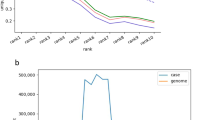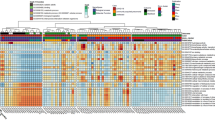Abstract
According to the WHO, dual use research of concern (DURC) is “life sciences research that is intended for benefit, but which might easily be misapplied to do harm”. Recent studies, particularly those on influenza viruses, have led to renewed attention on DURC, as there is an ongoing debate over whether the benefits of gain-of-function (GOF) experiments that result in an increase in the transmission and/or pathogenicity of potential pandemic pathogens (PPPs) are outweighed by concerns over biosecurity and biosafety. In this Viewpoint article, proponents and opponents of GOF experiments discuss the benefits and risks associated with these studies, as well as the implications of the current debate for the scientific community and the general public, and suggest how the current discussion should move forward.
This is a preview of subscription content, access via your institution
Access options
Subscribe to this journal
Receive 12 print issues and online access
$259.00 per year
only $21.58 per issue
Buy this article
- Purchase on SpringerLink
- Instant access to full article PDF
Prices may be subject to local taxes which are calculated during checkout
Similar content being viewed by others
References
Imai, M. et al. Experimental adaptation of an influenza H5 HA confers respiratory droplet transmission to a reassortant H5 HA/H1N1 virus in ferrets, Nature 486, 420–428 (2012).
Herfst, S. et al. Airborne transmission of influenza A/H5N1 virus between ferrets, Science 336, 1534–1541 (2012).
Langlois, R. A. et al. MicroRNA-based strategy to mitigate the risk of gain-of-function influenza studies, Nature Biotechnol. 31, 844–847 (2013).
Lipsitch, M. & Galvani, A. P. Ethical alternatives to experiments with novel potential pandemic pathogens. PLoS Med. 11, e1001646 (2014).
Lipsitch, M. Can limited scientific value of potential pandemic pathogen experiments justify the risks? MBio. 5, 5 (2014).
Johansson, L. et al. CD46 in meningococcal disease. Science 301, 373–375 (2003).
Henkel, R. D., Miller, T. & Weyant, R. S. Monitoring select agent theft, loss and release reports in the United States — 2004–2010. Appl. Biosafety 18, 171–180 (2012).
Kaiser, J. Moratorium on risky virology studies leaves work at 14 institutions in limbo. ScienceInsider [online], (2014).
Relman, D. A. The increasingly compelling moral responsibilities of life scientists. Hastings Center Rep. 43, 34–35 (2013).
Relman, D. A. “Inconvenient Truths” in the pursuit of scientific knowledge and public health. J. Infect. Dis. 209, 170–172 (2014).
Panel on Scientific Communication and National Security, National Academy of Sciences, National Academy of Engineering, Institute of Medicine. Scientific Communication and National Security (The National Academies Press, 1982).
Casadevall, A., Howard, D. & Imperiale, M. J. The apocalypse as a rhetorical device in the influenza virus gain-of-function debate. MBio. 5, e02062–14 (2014).
Casadevall, A., Howard, D. & Imperiale, M. J. An epistemological perspective on the value of gain-of-function experiments involving pathogens with pandemic potential. MBio. 5, e01875–e01814 (2014).
Casadevall, A. & Imperiale, M. J. Risks and benefits of gain-of-function experiments with pathogens of pandemic potential, such as influenza virus: a call for a science-based discussion. MBio. 5, e01730–e01714 (2014).
Enserink, M. Tiptoeing around Pandora's Box. Science 305, 594–595 (2004).
Oye, K. A. et al. Regulating gene drives. Science 345, 626–628 (2014).
Author information
Authors and Affiliations
Corresponding authors
Ethics declarations
Competing interests
W.P.D., M.J.I. and D.A.R. declare no competing interests. R.A.M.F. receives research support for gain-of-function research from the US National Institutes of Health (NIH), the US National Institute of Allergy and Infectious Diseases (NIAID) and the European Union. M.L. receives research funding for pneumococcal vaccine modelling projects from PATH Vaccine Solutions and Pfizer.
Related links
Rights and permissions
About this article
Cite this article
Duprex, W., Fouchier, R., Imperiale, M. et al. Gain-of-function experiments: time for a real debate. Nat Rev Microbiol 13, 58–64 (2015). https://doi.org/10.1038/nrmicro3405
Published:
Issue date:
DOI: https://doi.org/10.1038/nrmicro3405
This article is cited by
-
Biosynthesis pathways of expanding carbon chains for producing advanced biofuels
Biotechnology for Biofuels and Bioproducts (2023)
-
Gain-of-Function Research: Ethical Analysis
Science and Engineering Ethics (2016)



